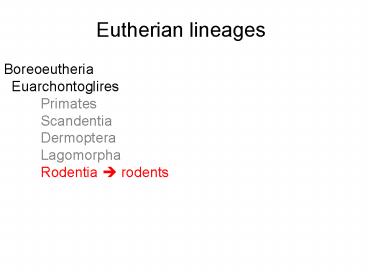Eutherian lineages - PowerPoint PPT Presentation
1 / 60
Title:
Eutherian lineages
Description:
food, burrows, caring for queen and her young) grasshopper ... Arvicolinae: North America. voles. Mircotus: lots of species. Phenacomys: heather and tree voles ... – PowerPoint PPT presentation
Number of Views:68
Avg rating:3.0/5.0
Title: Eutherian lineages
1
Eutherian lineages
Boreoeutheria Euarchontoglires Primates Scande
ntia Dermoptera Lagomorpha Rodentia ? rodents
2
Rodentia
- phylogeny
- key innovations
- diversity
- ecology
- epidemiology
- biogeography
- N.A. taxa
3
Rodentdiversity
- about 30 families
- gt ?000 species
4
Rodent evolution
- key innovations jaws and incisors
rootless incisors
diastema no canines
specialized chewing muscles
5
Rodent phylogeny
6
Rodentia categorized by chewing muscle types
infraorbital foramen comparisons
7
Rodentia categorized by chewing muscle types
modifications of origin of masseter muscle ?
increasing efficiency of chewing
8
Rodent phylogenysciuromorphous morphology
9
Rodentia categorized by chewing muscle types
hystricomorphous - capybara, guinea pig,
porcupine
10
Rodent phylogenyhystricomorphous morphology
11
Rodentia categorized by chewing muscle types
myomorphous - rats, mice, hamsters, gerbils
12
Rodent phylogenymyomorphous morphology
13
Rodentia rodentscategorized by mandible types
14
Rodent phylogeny
Sciurognathus jaws
Hystricognathus jaws
15
Rodentia convergent evolution
- body types
- locomotion
- ecology
- life history
- behavior
16
Rodentia convergent evolution
- saltatorial (?) rodents
Dipodidae jumping mice N. America jerboas N.
Africa, C. Asia
Heteromyidae kangaroo rats N. America
Muridae Austrailia, hopping mice Australia
17
Rodentia convergent evolution
- fossorial (?) rodents
Ctenomyidae tuco tucos South America
Geomyidae pocket gophers North America
Bathyergidae mole rats Africa
18
Rodentia convergent evolution
- semi-? rodents
Hydrochaeridae capybara S. America
Muridae muskrat N. America
Myocastoridae nutria S. America (now N.
America)
19
Rodentia convergent evolution
- ? rodents
Hystricomorpha Old world porcupine
Caviomorpha New world porcupines
Muroidea Acomys
20
Rodentia convergent evolution
- Josephoartigasia monesi
- Uruguay, 2-4 million years ago
Pygmy hippo
21
Rodentia convergent evolution
- Phoberomys pattersoni
- Venezuela, 8 million years ago
Pygmy hippo
22
Rodentia teeth and feeding
- cusp shape
- crown height
- rooted or rootless
23
Rodentia teeth and feeding
- ? ? ? or ?
- short ?
- rooted
24
Rodentia teeth and feeding
- ?/super? ? ?
- - high ?
- - rootless (?)
25
Rodentia teeth and feeding
- hypsodont/superhypsodont ? herbivory
B browsers Mf mixed feeders G grazers VG
variable grazers VB variable browsers
26
- Merriams kangaroo rat
- - arid-adapted physiology and behaviors
- metabolic water food water conservation
- physiological ? conservation
- behavioral ? conservation
27
- metabolic ?
- byproduct of ?
28
- food selection
- gtH2O available in ? than ?
- - granivores
29
- physiological ? conservation
- ? recovery in the kidney
- extremely concentrated ?
30
- behavioral ? conservation
- - stay in burrow during ?
31
- naked mole rats Heterocephalus glaber
- - ? mammals
32
- naked mole rats Heterocephalus glaber
- ? mammals
- Q?
- ? (1-3 males mate)
- ? (males/females defend)
- ? (food, burrows, caring for queen and her
young)
33
- grasshopper mice Onychomys
- - insectivory, predatory
34
Rodentia community ecology
- habitat selection
- competition ? niche partitioning?
- physiological or behavioral adaptations?
- predator avoidance?
35
Rodentia community ecology
- habitat selection ?coexistence
Heteromyidae genus Chaetodipus sandy soil
species w/o rump spines coarse substrates w/
rump spines
36
Rodentia community ecology
- habitat selection
Muridae genus Peromyscus P. crinitus on
rocks P. truei in pinon-juniper woodland
37
Rodentia community ecology
- habitat selection
Muridae genus Peromyscus P. maniculatus (deer
mouse) ultimate generalist!
38
Rodentia community ecology
- activity patterns effect of moonlight
- predator avoidance
39
Rodentia community ecology
- keystone species Dipodomys spectabilis
40
Rodentia epidemiology
- emerging DANGEROUS viruses??
Peromyscus maniculatus (deer mouse) and
hantavirus pulmonary syndrome
41
Rodentia epidemiology
- emerging DANGEROUS viruses??
rodent / hantavirus ? long history of
co-evolution
42
Rodentia epidemiology
- rodents, fleas, and plague
43
Rodentia epidemiology
- rodents, fleas, and plague
sylvatic reservoirs prairie dogs (Cynomys),
and rodents using their burrows
44
Rodentia hibernation and torpor
- seasonal or daily physiological decrease
- in metabolic rate
45
Rodentia hibernation and torpor
46
Rodentia biogeography
- Beringia periodic Miocene - Pleistocene
- dispersal route
voles Microtus, Clethrionomys squirrels
Glaucomys, Marmota
47
Rodentia biogeography
- Great American Interchange ?
- explosive adaptive radiation
- Cricetidae
- Neotominae North America
- 16 genera, 124 species
- Sigmodontinae South America (mostly)
- 74 genera, 377 species
48
Neotominae North America 16 genera, 124 species
Neotoma woodrats
Peromyscus deer mouse, etc.
Onychomys grasshopper mice
Reithrodontomys harvest mice
49
Sigmodontinae South America (mostly) 74 genera,
377 species
Phyllotis leaf-eared mice
Oligoryzomys rice rats
Sigmodon cotton rats North American
50
Rodent phylogenyNorth American taxa
51
Rodent phylogenyNorth American taxa
Muriodea Muridae or Cricetidae New World mice,
rats, voles, lemmings
52
Arvicolinae North America voles
Mircotus lots of species
Phenacomys heather and tree voles
Clethrionomys red-backed voles
53
Rodent phylogenyNorth American taxa
Dipodoidea Dipodidaejumping mice (Zapus)
54
Rodent phylogenyNorth American taxa
Geomyoidea Geomyidae pocket gophers Heteromyid
ae kangaroo rats, kangaroo mice, pocket
mice
55
Rodent phylogenyNorth American taxa
Geomyoidea Geomyidae pocket gophers
56
Rodent phylogenyNorth American taxa
Geomyoidea Heteromyidae kangaroo rats,
kangaroo mice, pocket mice
57
Rodent phylogenyNorth American taxa
Castoridae Beavers
58
Rodent phylogenyNorth American taxa
Sciuridae Squirrels, Chipmunks,
Marmots, Prairie dogs
59
Rodent phylogenyNorth American taxa
Caviomorpha Erethizontidae porcupines
60
Rodentia all for now































